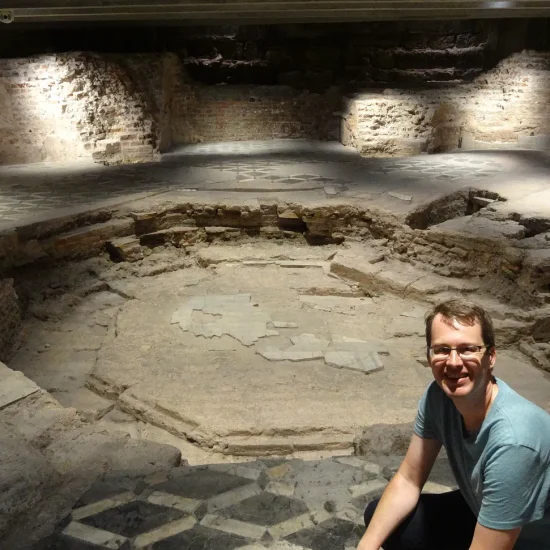
We are not spiritually, emotionally, or physically ready for Easter until we have journeyed through Lent.
A good friend once told me we don’t need the church calendar because of Easter. We should live every day in light of the resurrection. Using the church calendar, he said, was like play-acting. Why would we pretend Jesus is yet to be been born by observing Advent when we know Christmas happened? Why go through the sacrifices of fasting, charity, and lament during Lent, when we know resurrection happened? Valid questions to be sure. It is easy to see with this mindset how the church calendar and lectionary readings can feel like performative Christianity.

Greg Mamula
That conversation exemplifies many of my encounters with Baptists regarding the church calendar and lectionary readings. One of the reasons I think most Baptists find it difficult to embrace the church calendar and lectionary is because they are primarily a Good Friday people (ironically a key component of Lent). Baptists put a lot of well-deserved emphasis on the cross and its atoning implications. The cross appears so prominently in hymns, praise songs, jewelry, home décor, bumper stickers, t-shirts, and church logos, it is no wonder we talk about it the way we do. Baptists love to tell the story of how Jesus sacrifices himself for the world to forgive sin. The salvation story of scripture runs right through Calvary and the cross, no doubt.
But when the cross becomes the only lens through which to examine the Christian experience, we miss out on many other rich elements both scripture and tradition have to offer. By over-emphasizing one part of the story, our spiritual and scriptural imaginations become closed off to the power of the full resurrection story.
Aaron Damiani, in his book The Good of Giving Up: Discovering the Freedom of Lent, cautions that when we ignore the full gospel story, we will seek nourishment from the unhealthy parts of our world and culture to meet our needs. We will instead fill our minds and souls with things like politics, current streaming trends, social media, and our children’s extracurricular activities. We become so full we have no more room for the feast that is Easter. When we exchange the exhilarating and expansive story of the gospel for lesser stories shaped by our fears, pain, and unhealthy desires, we curve in ourselves like a gollum. We are designed to be people who look upward and outward with our souls, to dance with the holy trinity as they continue to move in and through the world.
Lent is not a destination. Lent is a season designed to make room for the Holy Spirit to work in our lives. We cannot simply go shopping for pastel outfits, hide eggs, and decorate baskets and believe we are ready to comprehend and embrace resurrection. We need to prepare for that sort of power. Lent is like preparing the soil and planting seeds in a garden in anticipation that something will grow later. The three disciplines of Lent: prayer, fasting, and charity (alms giving) are not goals or accomplishments in and of themselves. They are practices and habits of discipleship that prepare us for what God can and will do through us. They help refocus our attention away from distractions and onto the active presence of the Trinity at work in the world. Lent prepares us for Easter and beyond.
Lent also helps us better interact with the world around us. The chaotic cacophony of war, an ongoing pandemic, political and social polarization, economic uncertainty, and baseball lockouts are enough to cause fear and anxiety in anyone, not even accounting for most of our struggles, which are much more personal and painful: wondering how to maintain peace with a co-worker, pay overdue credit cards, nurture and love a child through questions of sexual and gender identity, wondering how you are going to repair your car or house, or decide if now is the time to change careers or zip codes. These are things that keep us awake at night.
Good Friday, when unaccompanied by the rest of the story, is not big enough to handle the day-to-day chaos alone. It is good and right to remember the mercy of the cross, but it does little to comfort a grieving parent, someone who has been suddenly laid off, a surprise diagnosis, or the sounds of war invading your city. The season of Lent reminds us that Jesus also toiled in the wilderness using fasting and prayer to draw near to the Father. Lent tells the story that God always brings the exiled home to live in peace. Lent emphasizes that there is a community called the Church who journeys with you through the darkest of nights.

Bruno van der Kraan / Unsplash
Lent reminds us that through Jesus, God is making all things right. Lent tells us there is hope, and because we are bombarded by daily evil, that level of hope requires a gradual adjustment period like our need to adjust to a sudden light in a darkened room. The practice of Lent is a 40-day season to adjust our thinking and believing and living in such a way that we can embrace spiritually, emotionally, and physically the fully illuminated hope of resurrection.
I am observing a growing enthusiasm among younger Baptist pastors who appear more open to preaching through the lectionary. They are also becoming more comfortable introducing basic elements of the church calendar to their congregations. Often this requires they make contextual modifications to it, as all good Baptist pastors should. I appreciate their willingness to tell the whole biblical narrative by leveraging the imagery of seasons like Advent, Epiphany, Lent, and Easter in conjunction with the well-practiced seasons of Christmas and Easter. Taken together these seasons tell the whole story of the life, death, resurrection, ascension, and hopeful return of Jesus. Is that really so bad?
Rev. Dr. Greg Mamula is the Associate Executive Minister for the American Baptist Churches of Nebraska, and a contributing writer for Word&Way. He is the author of Table Life: An Invitation to Everyday Discipleship, published by Judson Press in print and e-reader versions from online distributors including Amazon. To learn more information visit www.table-life.org.






